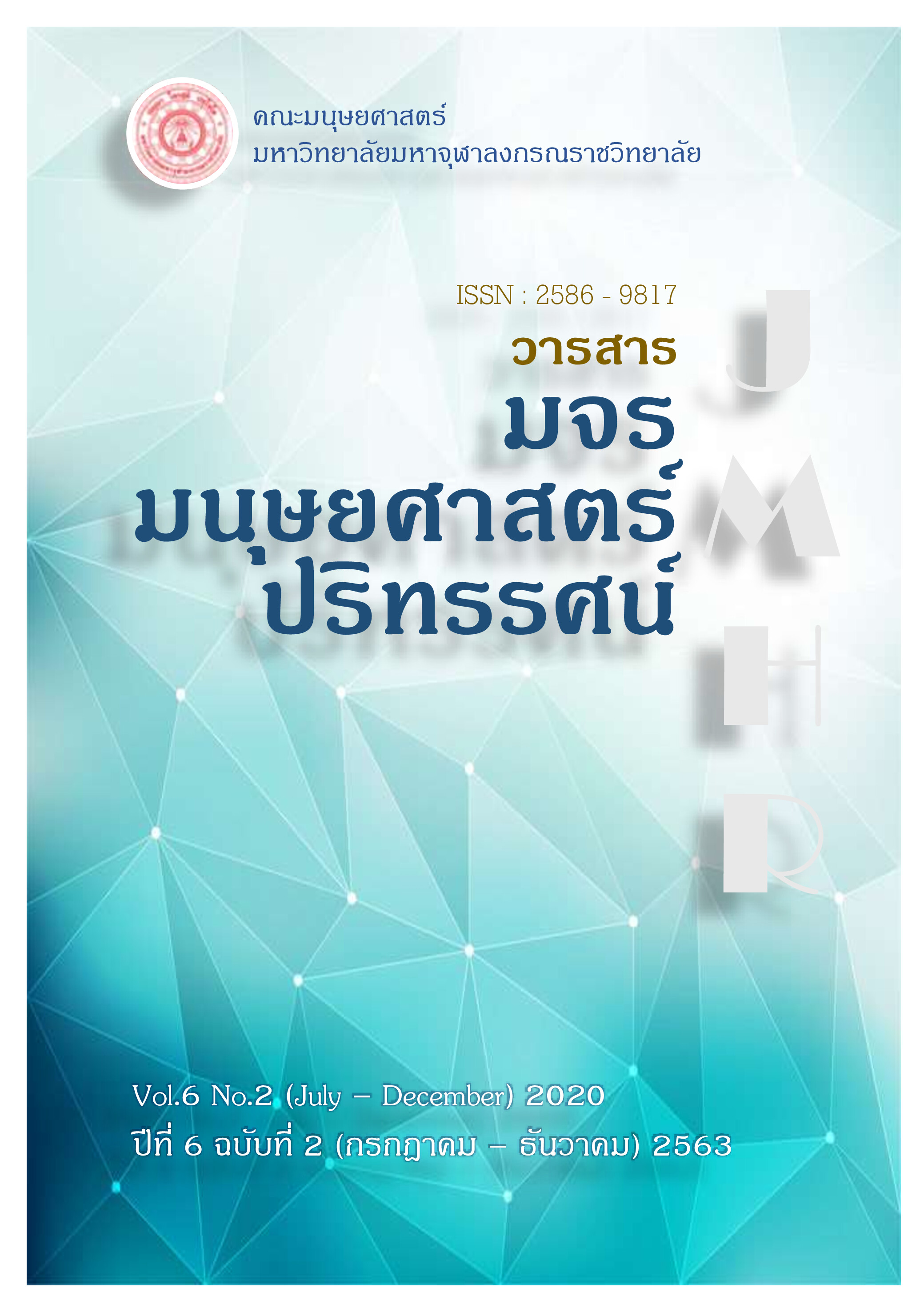ปัจจัยที่ส่งผลต่อประสิทธิผลของพระสังฆาธิการในการบริหารวัด
คำสำคัญ:
ปัจจัย, ประสิทธิผล, การบริหารวัดบทคัดย่อ
บทความนี้มีวัตถุประสงค์เพื่อต้องการวิเคราะห์ปัจจัยที่ส่งผลต่อประสิทธิผลในการบริหารวัด ซึ่งเป็นการศึกษาข้อมูลจากเอกสารและงานวิจัยที่เกี่ยวข้องของพระสังฆาธิการ นักวิชาการด้านมนุษยศาสตร์และสังคมศาสตร์ โดยผู้วิจัยใช้การวิเคราะห์ข้อมูลจากเอกสารที่รวบรวมแบบการวิเคราะห์ข้อมูลเชิงเนื้อหา พบว่า ปัจจัยที่ส่งผลต่อประสิทธิผลในการบริหารวัด ประกอบด้วย 1) ปัจจัยภายใน ได้แก่ พระสังฆาธิการต้องมีภูมิรู้เกี่ยวกับอำนาจหน้าที่ของเจ้าอาวาสอย่างชัดเจน มีความรู้เกี่ยวกับประวัติศาสตร์พระพุทธศาสนา สถานการณ์ทั่วไปและรอบข้าง มีภูมิธรรม คือต้องเข้าใจหลักธรรมอย่างลึกซึ้งและสามารถในการเผยแผ่ธรรมะ มีภูมิฐาน คือ ต้องมีข้อวัตรปฏิบัติที่ดีงาม มีความขยันอดทน มีความเมตตา มีความเสียสละ ไม่เห็นแก่ลาภ ยศ อามิส และมีภูมิบริหาร คือ ต้องรู้และเข้าใจในการวางแผน การบริหารโครงการการจัดระบบงาน/แบ่งงานกันทำการมอบหมายหน้าที่มีการจัดองค์การ การบริหารงานบุคคล การวินิจฉัยสั่งการ การควบคุมงาน การประสานงาน การเสนอรายงาน การทำงานเป็นหมู่คณะ มีความโปร่งใสในการบริหารเงินของวัด และ 2) ปัจจัยภายนอก ได้แก่ พระสังฆาธิการต้องมีการส่งเสริมการศึกษา การจัดการมุ่งประโยชน์ใช้สอยคุ้มค่า การจัดการสิ่งแวดล้อมภายในวัด การอบรมสั่งสอนหลักคุณธรรมจริยธรรม ความสามารถในการประสานงานกับฝ่ายอาณาจักร การสงเคราะห์สังคม และการจัดการศึกษาสาธาณสงเคราะห์
เอกสารอ้างอิง
คนึงนิตย์ จันทบุตร และสุบรรณ จันทบุตร. (2545). สถานะและบทบาทของพระพุทธศาสนาในประเทศไทย. กรุงเทพฯ : กลุ่มประสานงานศาสนาเพื่อสังคม.
ทินพันธ์ นาคตะ. (2529). พระพุทธศาสนากับสังคมไทย. กรุงเทพฯ: อักษรเจริญทัศน์.
ธงชัย สันติวงษ์. (2554). ทฤษฎีองค์การและการออกแบบ. กรุงเทพฯ: ไทยวัฒนาพานิช.
ประเวศ วะสี. (2539). พระสงฆ์กับการรู้เท่าทันสังคม .คู่มือพระสังฆาธิการ ว่าด้วยเรื่องการคณะสงฆ์และการพระศาสนา. กรุงเทพฯ: โรงพิมพ์กรมศาสนา.
ปุระชัย เปี่ยมสมบูรณ์. (2545). การจัดระบบบริหารราชการจังหวัดแบบบูรณาการเพื่อพัฒนา. กรุงเทพฯ: สมาคมรัฐศาสตร์ แห่งมหาวิทยาลัยธรรมศาสตร์.
พระธรรมกิตติวงศ์ (ทองดี สุรเตโช). (2546). บทบาทของสถาบันพระพุทธศาสนากับการจัดการศึกษา. กรุงเทพฯ: เลี่ยงเชี่ยง.
พระมหาเสริมชัย ชยมงฺคโล. (2539). การบริหารวัด. กรุงเทพฯ: สถาบันพุทธภาวนาวิชชาธรรมกาย.
พระราชญาณวิสิฐ (เสริมชัย ชยมงฺคโล). (2549). คุณภาพชีวิตการทํางาน. กรุงเทพ ฯ : สุวีริยาสาส์น.
วีระพันธ์ เขมะนุเชษฐ์. (2559). ประสิทธิภาพ และประสิทธิผล. สืบค้น 20 พฤษภาคม 2562, จาก http://bankusayei.blogspot.com/2015/01/blog-post.html#comment-form.
สมเด็จพระมหาสมณเจ้ากรมพระยาวชิรญาณวโรรส (2540). นวโกวาท ฉบับประชาชน. กรุงเทพฯ: มหามกุฏราชวิทยาลัย.
สมพงษ์ เกษมสิน. (2536). การบริหาร (พิมพ์ครั้งที่ 8). กรุงเทพ ฯ: ไทยวัฒนาพาณิชย์.
สำนักงานพระพุทธศาสนาแห่งชาติ. (2546). หลักการบริหารวัดสมัยใหม่. กรุงเทพฯ: สำนักงานเลขาธิการมหาเถรสมาคม.
สำนักงานพระพุทธศาสนาแห่งชาติ. (2554). คู่มือพระสังฆาธิการ. กรุงเทพฯ: สำนักงานเลขาธิการมหาเถรสมาคม.
Fiedler, F.E. (1967). A Theory of Leadership Effectiveness. New York: McGraw –Hill.
Seashore, S.E. & Yuchtman, E. (1967). Factorial Analysis of Organizational Performance. Administrative Sciences Quartery.
Steers, R.M. (1977). Organization Effectiveness. California: Goodyear Publishers Inc.






